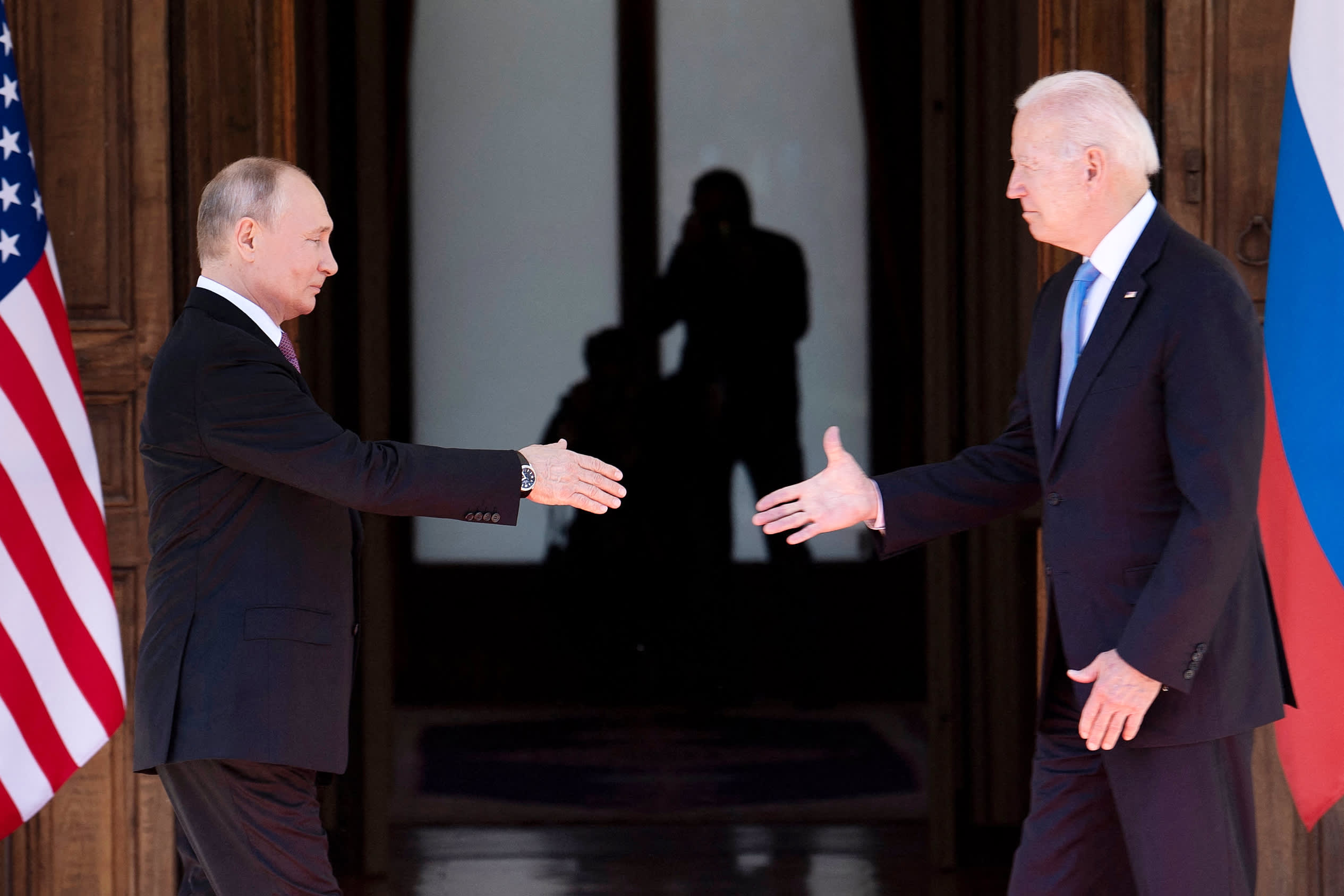
Russian President Vladimir Putin (L) shakes hands with US President Joe Biden prior to the US-Russia summit at the Villa La Grange, in Geneva on June 16, 2021.
Brendan Smialowski | AFP | Getty Images
Russian President Vladimir Putin said he and President Joe Biden agreed Wednesday that their respective ambassadors will return to their foreign posts, marking a resumption of diplomatic operations between the two adversaries that had been suspended since April.
Currently, neither Russia’s ambassador to the U.S., Anatoly Antonov, nor Washington’s ambassador to Moscow, John Sullivan is stationed at his post.
They were both recalled this spring after Biden announced a fresh round of U.S. sanctions aimed at punishing Russia for a massive cyberattack last year on American government agencies.
As a result, consular operations, visas and other diplomatic services in both countries effectively ground to a halt. This breakdown had a ripple effect on industries, families and aid groups that maintain ties in both countries.
The return of the ambassadors was one of the few concrete outcomes to emerge immediately after the two leaders met face to face in Geneva on Wednesday.
The summit began with a 90 minute meeting featuring only Biden, Putin and their top foreign policy aides, Secretary of State Antony Blinken and Russian Foreign Minister Sergey Lavrov.
Following the meeting, the two sides moved on to an expanded bilateral session with more aides.
Officials had previously agreed that Putin would give the first press conference following the talks, and Biden would speak afterward.
Topping the agenda were nuclear arms control, cyberwarfare and security, Syria’s civil war and Iran’s nuclear program.
Nuclear talks
In February, the Biden administration extended a crucial nuclear weapons treaty with Russia for five more years.
But the New Strategic Arms Reduction Treaty, or New START, is currently the only arms control treaty in place between Washington and Moscow.
Former President Donald Trump withdrew from the Intermediate-Range Nuclear Forces, or INF treaty. Similar to the INF treaty, New START limits the nuclear arsenals of Washington and Moscow.
Putin and Biden have expressed a desire to reestablish a channel for conducting high-level nuclear talks, and both leaders recognize this as an area where the two countries have long maintained a dialogue despite their fractured relations on other issues.
The United States and Russia own the lion’s share of the world’s nuclear weapons.
Cybercrime
Biden also intended to warn Putin that unless he takes action to stop Russian-based cybercriminals, the United States will act instead, potentially disrupting Russia’s digital infrastructure.
Biden’s warning follows two targeted ransomware attacks in the past month that have directly impacted American citizens, both perpetrated by criminals believed to be based in Russia.
The first was an attack in early May on the operator of the nation’s largest gas pipeline, Colonial Pipeline. The attack forced the company to shut down approximately 5,500 miles of fuel pipeline, leading to a disruption of nearly half of the East Coast’s fuel supply and causing gasoline shortages in the Southeast and airline disruptions.
The second attack, this one by a different Russian-based cybercriminal group, targeted JBS, the world’s largest meat supplier. The company ultimately paid $11 million in ransom, but not before it briefly shut down its entire U.S. operation.
Putin has denied any knowledge of the attacks, and recently suggested that if the cybercriminal groups were not breaking any Russian laws, then there was nothing he could do to stop them.
But U.S. officials said the idea that Putin was unaware of the attacks wasn’t credible, given the tight grip he maintains over Russia’s intelligence services, and its murkier, off-the-books network of contractors.
Biden also intended to press Putin on Russia’s illegal annexation of Crimea and arming of separatists in eastern Ukraine, the poisoning and imprisonment of Russian opposition leader Alexei Navalny, and the fate of two American former Marines in Russian custody.
There was little expectation of a breakthrough from either side. Biden and Putin recently said they believe Russian-American relations are at their lowest point since the Cold War.
Officials in Moscow and Washington spent months lowering expectations for the summit, and this week aides to both leaders said it was unlikely that any agreements would be reached in Geneva.
Yet from this nadir, the United States saw the summit as an opportunity to build a more stable and predictable relationship between the world’s two biggest nuclear powers.




